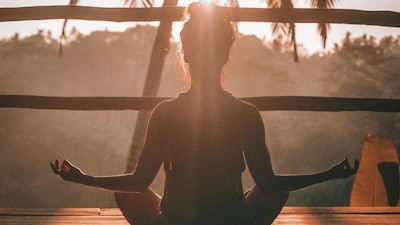
A new virtual reality (VR) tool is healing student athletes mentally, while they work on getting stronger physically. At University of North Carolina, assistant professor Shelby Baez is pioneering VR-guided mindfulness meditations to improve female athlete recovery and reduce risk of re-injury.
Baez is focusing specifically on student-athletes with ACL injuries, for now, but this technique could be used on a variety of injuries in the future.
“This provides a plug-and-play solution for doctors to treat patients psychologically in clinical practice,” said Baez.
Baez is specifically interested in working with student-athletes who have had an ACL reconstruction surgery, because as the primary stabilizing ligament in the knee, all athletes rely majorly on their ACL for performance when running, jumping and other actions.
During the eight-week clinical trial, students come into the lab three days each week for a session of VR mindfulness meditation. After the meditation, they complete jump landing biomechanics activities and a standard physical therapy appointment, complete with leg and glute exercises. They wear an Oura Ring so Baez and other clinical professionals can assess their biometrics outside of the lab as well.
Before starting this trial at UNC, Baez worked as an athletic trainer at Midway University of Kentucky where her interest in this unique approach to recovery began. “I had a lot of patients who exhibited fear and decreased confidence after their injury, and I wanted to figure out how to help them. Sport psychology allowed me to learn how to do that,” said Baez.
Reducing the stress and anxiety about re-injury is the goal when adding mindfulness meditation to an athlete’s recovery journey. The mind also plays a significant role in the perception of pain, so these mindful meditations may alleviate some of an athlete’s perceived pain as well.
The mindfulness meditations can also alleviate some of the athlete’s stressors around identity. Often, an athlete’s identity is closely tied to their sport, and when they are sidelined with an injury, their mental health can take a turn for the worse, feeling that they’ve lost a major part of their identity. However, Baez wants the athletes to know that it is important to listen to their bodies. She wants to see the re-injury statistics decrease. Currently, athletes who return to their sport within two years of an ACL injury are 13 times more likely to re-injure.
One student-athlete taking part in Baez’s trial said, “The VR meditation was cool. After doing it, I felt very relaxed. I really enjoyed it, especially as I progressed with the breathing. That is something I’ve continued to do outside of the study when I’m feeling super stressed.”
Even the popular mental health app Headspace has resources for injured athletes, so while practicing mindfulness throughout recovery isn’t new, Baez’s integration of VR could be the next frontier in treating student-athletes.





































